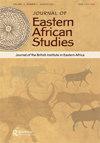“发展民族主义?马古富力的坦桑尼亚大规模土地投资的政治信任和政治
IF 0.6
3区 社会学
Q2 AREA STUDIES
引用次数: 5
摘要
对大规模土地投资(LSLIs)的研究可以为当今坦桑尼亚对发展民族主义的支持提供有价值的见解。“发展民族主义”是“解放的一种创造性变体”,声称要让“坦桑尼亚再次伟大”。已故总统马古富力的民族主义转向是建立在政治意识形态和选择性的过去历史的基础上的,这些历史将他推上了权力宝座。然而,关于围绕土地投资的政治实践如何促进对公共机构的信任和支持的研究有限。本文对LSLIs政治经济学的学术研究做出了两项重要贡献。首先,我们研究了LSLIs的混乱政治,设计和实施的失败,以及坦桑尼亚两个农村地区对发展民族主义的当地支持的上升。其次,使用潜在阶级分析(LCA),我们根据对总统、执政党(CCM)、坦桑尼亚投资中心(TIC)的信任和对lsli的支持来识别不同的个人群体。我们将政治信任定义为“基于人们的规范性期望,对一个机构或政府的评估取向”。本文章由计算机程序翻译,如有差异,请以英文原文为准。
‘Developmental nationalism?’ Political trust and the politics of large-scale land investment in Magufuli's Tanzania
ABSTRACT Research on large-scale land investments (LSLIs) can provide valuable insights into the support for developmental nationalism in Tanzania today. ‘Developmental nationalism’ is ‘a creative variant of liberation’, which purports to make ‘Tanzania great again’. The nationalist turn of late President Magufuli was grounded in political ideology and the selective history of the past that swept him to power. However, there is limited research on how political practice around land investments contribute to trust and support for public institutions. This paper makes two key contributions to scholarship on the political economy of LSLIs. First, we examine the messy politics of LSLIs, the failures in design and implementation, and the rise in local support for developmental nationalism in two rural settings in Tanzania. Second, using Latent Class Analysis (LCA), we identify distinct groups of individuals based on their trust in the President, the ruling party (CCM), the Tanzania Investment Centre (TIC) and support for LSLIs. We define political trust as ‘an evaluative orientation towards an institution or government, based on people's normative expectations’.
求助全文
通过发布文献求助,成功后即可免费获取论文全文。
去求助
来源期刊

Journal of Eastern African Studies
AREA STUDIES-
CiteScore
3.30
自引率
7.10%
发文量
12
期刊介绍:
Journal of Eastern African Studies is an international publication of the British Institute in Eastern Africa, published four times each year. It aims to promote fresh scholarly enquiry on the region from within the humanities and the social sciences, and to encourage work that communicates across disciplinary boundaries. It seeks to foster inter-disciplinary analysis, strong comparative perspectives, and research employing the most significant theoretical or methodological approaches for the region.
 求助内容:
求助内容: 应助结果提醒方式:
应助结果提醒方式:


